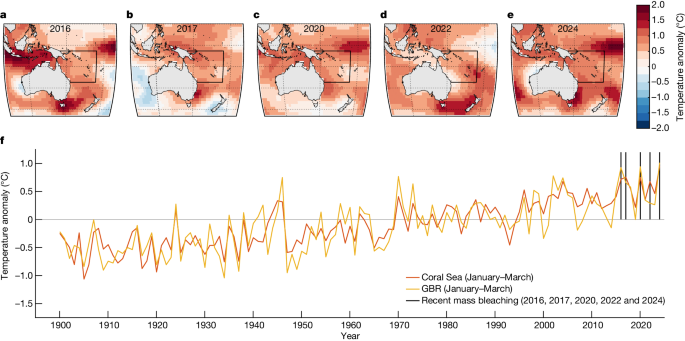Unprecedented Ocean Heat Extremes Threaten the Survival of the Great Barrier Reef
The content discusses the severe impacts of high sea surface temperatures (SST) on the Great Barrier Reef (GBR) in Australia. It shows that the recent ocean heat extremes in the Coral Sea during 2024, 2017, and 2020 were the warmest in the past 400 years, exceeding the 95th-percentile uncertainty limit of the pre-1900 maximum. The 2016, 2004, and 2022 events were also among the warmest, exceeding the 90th-percentile limit.
Climate model analysis confirms that human influence on the climate system is responsible for the rapid warming in recent decades. This attribution, along with the observed mass coral bleaching, indicates that the GBR ecosystem is now facing an existential threat from anthropogenic climate change. Without urgent intervention, the iconic GBR is at risk of experiencing temperatures conducive to near-annual coral bleaching, with negative consequences for biodiversity and ecosystem services. Continued warming on the current trajectory would further threaten the ecological function and outstanding universal value of one of Earth's greatest natural wonders.
客製化摘要
使用 AI 重寫
產生引用格式
翻譯原文
翻譯成其他語言
產生心智圖
從原文內容
前往原文
www.nature.com
Highest ocean heat in four centuries places Great Barrier Reef in danger - Nature
從以下內容提煉的關鍵洞見
by Benjamin J. ... 於 www.nature.com 08-07-2024
https://www.nature.com/articles/s41586-024-07672-x
深入探究
